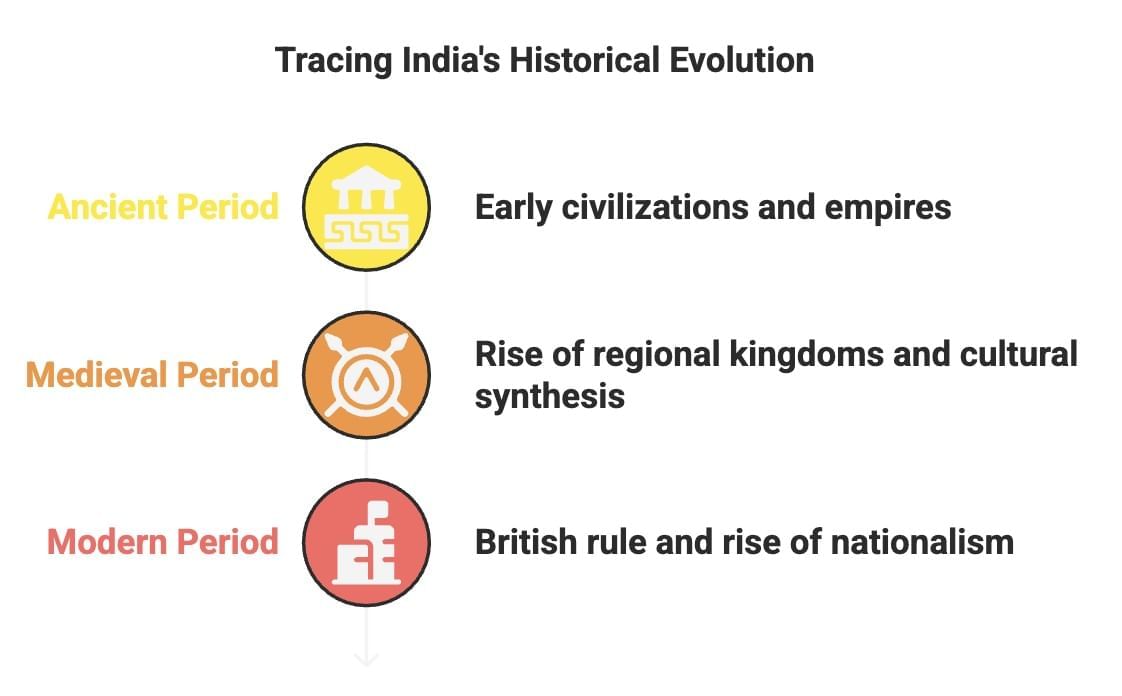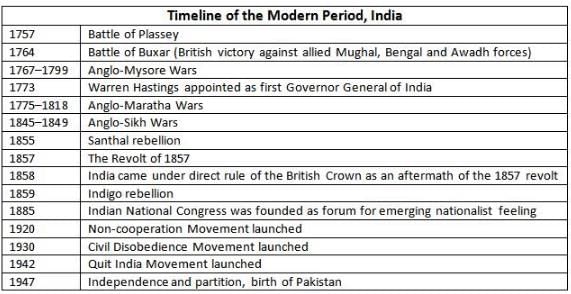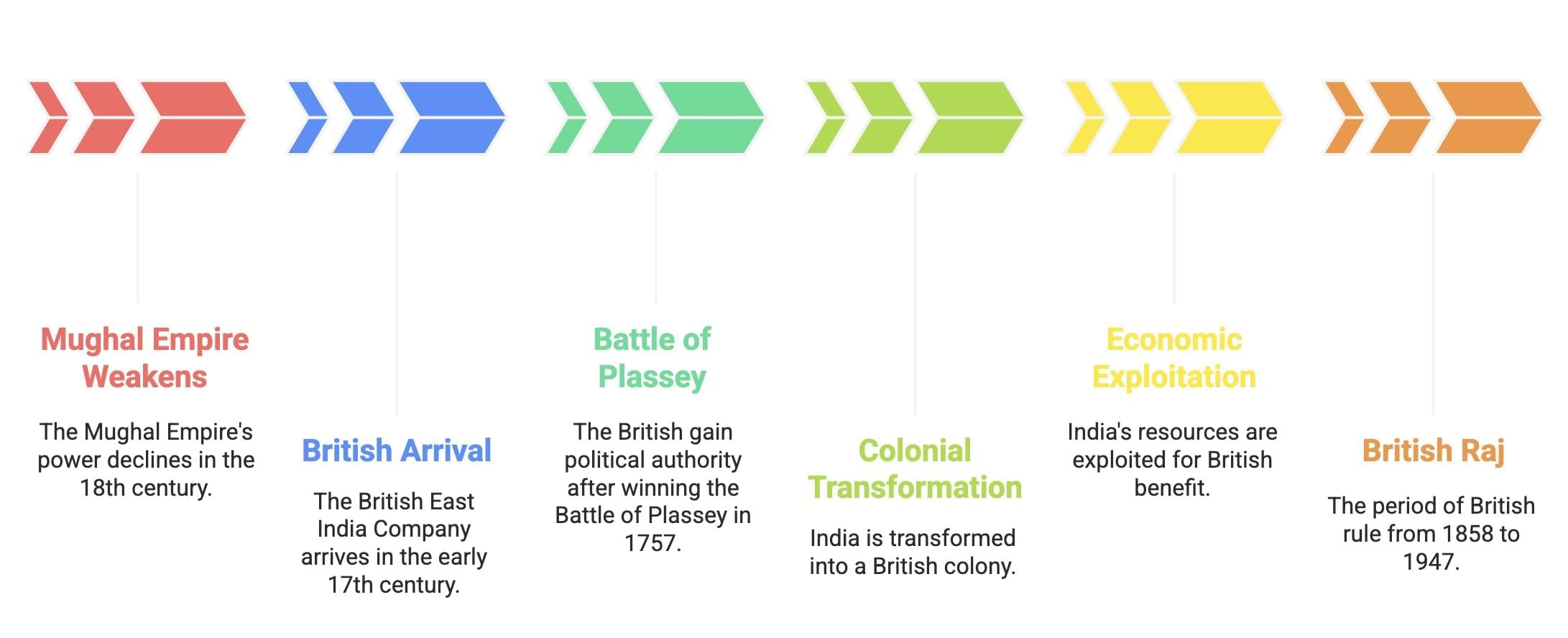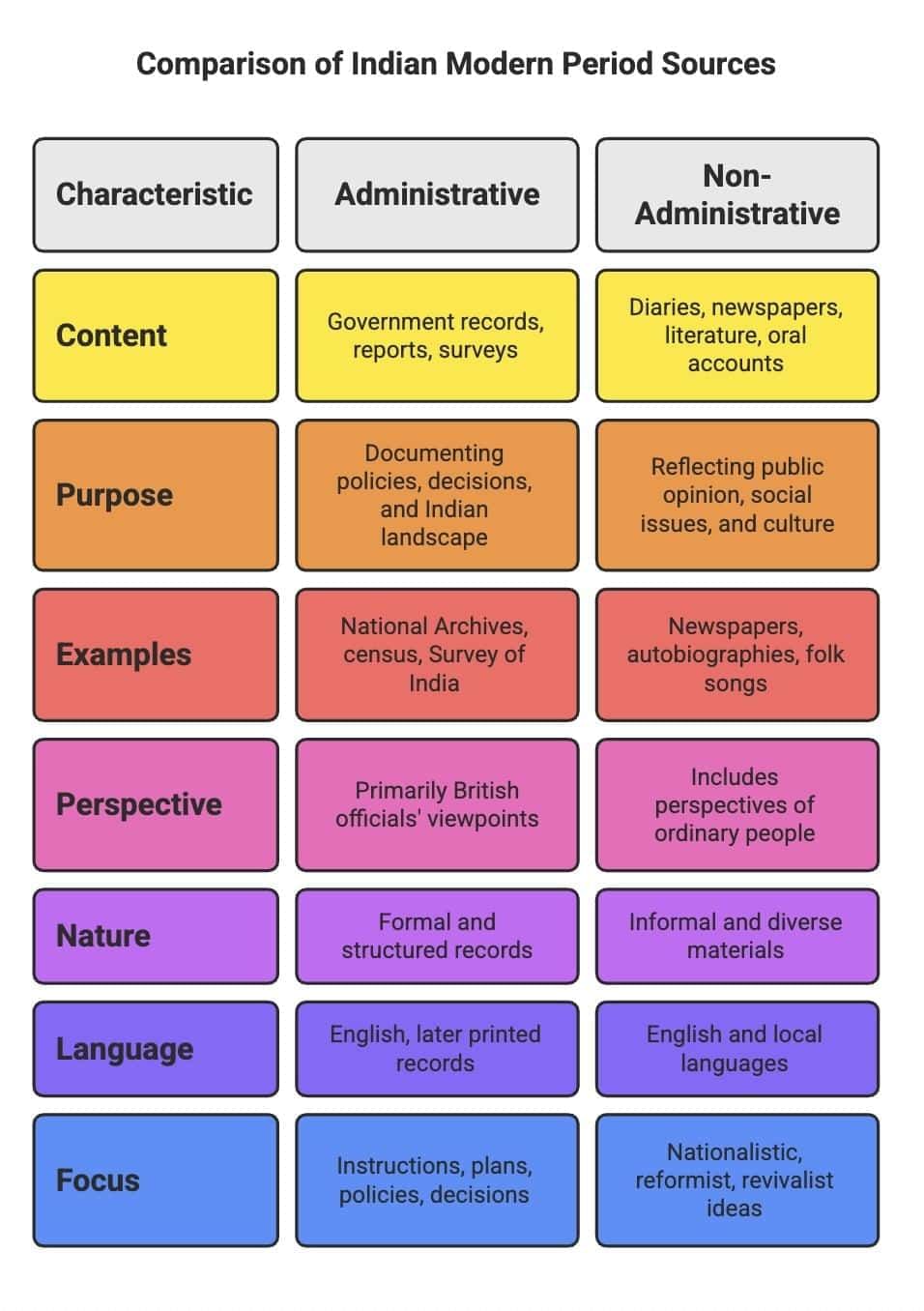The Modern Period Chapter Notes | History Class 8 ICSE PDF Download
| Table of contents |

|
| Introduction |

|
| Periodisation in History |

|
| Major Developments around the World |

|
| Modern Period in India: An Outline of the Time Frame |

|
| Sources |

|
Introduction
To understand the vast timeline of human history, historians divide it into different periods—a process known as periodisation. This helps make sense of major changes in society, politics, economy, and culture over time. In India, history is usually classified into Ancient, Medieval, and Modern periods. The Modern period, shaped by British rule, saw major transformations and the rise of nationalism. This chapter explores how Indian history is periodised, the global changes during the Industrial Revolution, and the types of sources—both official and personal—that help us study this time.

Periodisation in History
- Periodisation is the method used by historians to divide history into different periods based on specific characteristics.
- In earlier times, history was primarily concerned with rulers, wars, and major events. However, contemporary historians focus on various aspects of life, such as daily life, production, urban development, and the evolution of ideas and societies.
- A Scottish historian named James Mill wrote a book called "The History of British India" in 1817, in which he categorised Indian history into three periods: Hindu, Muslim, and British. Mill believed that both Hindu and Muslim rulers were authoritarian and thought that British rule could lead to progress through the implementation of British laws and institutions.
- Indian history is commonly divided into Ancient, Medieval, and Modern periods. The Modern period, characterised by British rule, is often associated with a lack of freedom, equality, and economic advancement.
- In the Western perspective, the Modern period emphasises the significance of science, democracy, and liberty, although these ideals were not fully realised in India during British rule.
Major Developments around the World
- The Industrial Revolution started in Europe, shifting economies from agriculture and handicrafts to industry and machinery.
- It brought progress in agriculture, technology, mining, transportation, and manufacturing.
- The Industrial Revolution impacted social, economic, political, and cultural facets of life.
- In Britain, prior to the Industrial Revolution, the economy was primarily agricultural.
- The introduction of steam-powered machines led to job losses for farm workers, driving them to migrate to urban areas.
- Britain’s population surged from 9 million in 1801 to 36 million by 1911, resulting in swift urban expansion.
- Railways improved communication, and the telegraph initiated a communication revolution.
- In 1840, Rowland Hill launched the penny post, making postal services more accessible to the public.
- European countries like Portugal, Spain, the Netherlands, Britain, France, and Germany competed to establish colonies in Asia and Africa.
- Colonies provided raw materials for industries and markets for finished products.
- Imperialism involves one country ruling over others, often exploiting their resources.
- Colonisation included settling and exploiting resources in a colony for the benefit of the ruling country.
- The Industrial Revolution significantly affected the working class, leading to both economic prospects and challenging working conditions.
Modern Period in India: An Outline of the Time Frame
- The 18th century saw the weakening of the Mughal Empire and the emergence of various regional powers in India.
- The British first came to India in the early 17th century, with the East India Company established in 1600, initially for trade before expanding their control over the region.
- The East India Company gained political authority in India after its victory in the Battle of Plassey in 1757.
- Subsequently, the British transformed India into a colony, exploiting it for raw materials and as a market for their goods.
- British policies severely harmed local Indian industries during their rule.
- India was often referred to as the "jewel of the British crown" due to its economic exploitation and strategic importance to the British Empire.
- The British unified various parts of India, bringing under control princely states that initially resisted their authority.
- British India was organised into the Bengal, Madras, and Bombay Presidencies.
- British policies during this period exploited India’s resources, benefiting only a small elite while causing widespread hardship.
- The term British Raj refers to the period of British rule in India from 1858 to 1947.


Sources
Sources for studying the modern period in India are divided into administrative and non-administrative sources.Types of sources for the modern period in India:
Administrative Sources
- The British meticulously documented their instructions, plans, policies, and decisions in detailed written records.
- These records comprised government reports, administrative files, and surveys.
- To safeguard these documents, record rooms were established in all administrative institutions.
- The British also founded the National Archives of India, while the National Museum was later established in 1949.
- The National Archives of India originated in 1891 in Kolkata as the Imperial Record Department, with the goal of managing and cataloguing government records.
- In 1921, it relocated to New Delhi and moved to its current building in 1926.
- Records from the early 19th century were initially handwritten by calligraphists, but later they were printed.
- These records reflect the thoughts and intentions of officials, but they often overlook the perspectives of ordinary people.
- The British conducted various surveys to gain insights into India’s flora, fauna, topography, soil, and local histories.
- These surveys encompassed revenue, botanical, zoological, anthropological, and archaeological aspects.
- Census surveys, initiated in the late 19th century, were conducted every 10 years to document population, religions, castes, and occupations.
- Mapping played a crucial role in administration, leading to the establishment of the Survey of India in Dehradun.
- Sir George Everest and William Lambton were instrumental in creating detailed survey maps and topographical sheets.
Non-administrative Sources
- Non-administrative sources encompass a wide range of materials such as diaries, autobiographies, newspapers, writings, paintings, photographs, films, advertisements, and radio broadcasts.
- Newspapers offered insights through editorials, cartoons, news articles, and letters, reflecting public opinions and sentiments.
- Literature produced by leaders, reformers, poets, and novelists in both English and local languages played a crucial role in shaping public thought.
- Oral sources, including folk songs, ballads, and legends, provide valuable glimpses into the lives of common people, peasants, and tribal communities.
- Contact with Western cultures led to the acceptance of Western ideas and the emergence of nationalist sentiments in India.
- Indian literature during this period reflected nationalistic, reformist, and revivalist ideas, inspiring feelings of patriotism and social reform.
Key writings include:
- Dadabhai Naoroji’s "Poverty and Un-British Rule in India" highlights the wealth drain to Britain.
- Bankim Chandra Chattopadhyay’s "Anandamath" and Dinbandhu Mitra’s "Neel Darpan" focus on British rule and the rise of nationalism.
- Writings by Raja Ram Mohan Roy, B.R. Ambedkar, Jyotirao Phule, and E.V. Ramasamy Naicker address social evils and the need for reforms.
- Jawaharlal Nehru’s "The Discovery of India" explores India’s history, philosophy, and cultural heritage.
- Mahatma Gandhi’s "Hind Swaraj" discusses the concepts of self-rule and British control in India.

Points To Remember
- History is the study of how societies change over time. To understand these changes better, historians divide history into different periods based on distinct characteristics—a method known as periodisation.
- In India, history is broadly divided into three periods: Ancient, Medieval, and Modern. The Modern period is also referred to as the Colonial period because it was marked by British rule.
- Globally, the Industrial Revolution brought a major shift from agriculture to industry, deeply influencing economic, social, and cultural life. During this time, European powers expanded their control over other regions.
- A colony is a territory ruled by another country, and colonisation is the process of settling in and exploiting that territory. Imperialism refers to the domination of one country over another for political or economic gain.
- The British established control over India after their victory in the Battle of Plassey in 1757, turning the region into a colony. The period of British rule, known as the British Raj, lasted from 1858 to 1947. During this time, British India was divided into administrative regions called the Bengal, Madras, and Bombay Presidencies.
- To study this period, historians use two main types of sources: administrative and non-administrative. Administrative sources include government records, reports, and surveys. Non-administrative sources consist of personal writings, newspapers, artworks, and architecture. The British also conducted various surveys—covering areas such as revenue, botany, zoology, anthropology, and archaeology—and carried out regular census surveys to document population, caste, religion, and occupation.
|
12 videos|54 docs|12 tests
|
FAQs on The Modern Period Chapter Notes - History Class 8 ICSE
| 1. What is periodization in history and why is it important? |  |
| 2. What are some major developments that took place around the world during the modern period? |  |
| 3. How is the modern period defined in the context of Indian history? |  |
| 4. What sources can be used to study the modern period in Indian history? |  |
| 5. What are the key points to remember about the modern period in India? |  |















